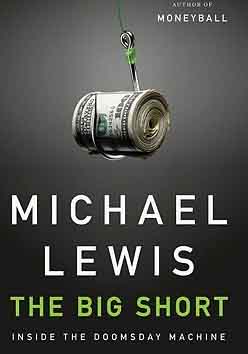 Anyone who cares to know how our economy practically collapsed in fall 2008 needs to read the latest page-turner from Michael Lewis.
Anyone who cares to know how our economy practically collapsed in fall 2008 needs to read the latest page-turner from Michael Lewis.
I just finished “The Big Short,” and it’s even better than his other classic business book, “Liar’s Poker.” (Imagine a book form of the movie “Wall Street”)
In addition to exceptional story-telling skills, Lewis has the intellect to explain the role of Wall Street financers, who were slicing and dicing subprime mortgages into bonds and then selling bets on those bonds.
Of course now it seems obvious that poor people with no documented income would soon default on $700,000 mortgages. And therefore packages of those mortgages would be very risky investments not worth the small interest yield. But very few people in the investment world saw that, and those who did had unusual characteristics that play a key role in Lewis’s book.
The problem for all of us on Main Street is that the Wall Street banks created money with leverage and all that cash flooded into the economy through mortgages. Now those funds are gone, and that means a lot less business for all of us, especially in the construction and retail industries. It’s also a key reason Richmond lost a stable company like LandAmerica, because when the financial markets shut down, LandAmerica couldn’t access supposedly short-term investments it needed to get money back to customers. (That’s a magazine story for another day).
But even more enlightening is the mindset of Wall Street, according to Lewis, which convinced itself that it had turned manure into gold. (I still cannot fathom what 23-year-old college grads do to earn their six-figure salaries. What are they producing or selling?)
 In Lewis’s view, the big investment houses are nothing more than gamblers playing with other people’s money. But even worse, firms like Bear Stearns and Morgan Stanley had no idea what they were doing, and all of us on Main Street are suffering from their hubris, even if we never invested with them or hired them for a specific job.
In Lewis’s view, the big investment houses are nothing more than gamblers playing with other people’s money. But even worse, firms like Bear Stearns and Morgan Stanley had no idea what they were doing, and all of us on Main Street are suffering from their hubris, even if we never invested with them or hired them for a specific job.
One particular passage I liked at the end reads, “The line between gambling and investing is artificial and thin.”
And later he explains the main reason there is so much scorn for Wall Street.
“The CEOs of every major Wall Street firm were also on the wrong end of the gamble. All of them, without exception, either ran their public corporations into bankruptcy or were saved from bankruptcy by the United States government. They all got rich, too.”
More reading:
Ten things we learned from “The Big Short” MarketWatch
For everyone trying to manage his own finances these days, it’s also a gold mine of valuable insights about how the modern economy really functions — and what you need to watch out for.
Aaron Kremer is the BizSense editor and a huge Michael Lewis fan. BizSense would like to host a happy hour discussion of the book if people are interested.
 Anyone who cares to know how our economy practically collapsed in fall 2008 needs to read the latest page-turner from Michael Lewis.
Anyone who cares to know how our economy practically collapsed in fall 2008 needs to read the latest page-turner from Michael Lewis.
I just finished “The Big Short,” and it’s even better than his other classic business book, “Liar’s Poker.” (Imagine a book form of the movie “Wall Street”)
In addition to exceptional story-telling skills, Lewis has the intellect to explain the role of Wall Street financers, who were slicing and dicing subprime mortgages into bonds and then selling bets on those bonds.
Of course now it seems obvious that poor people with no documented income would soon default on $700,000 mortgages. And therefore packages of those mortgages would be very risky investments not worth the small interest yield. But very few people in the investment world saw that, and those who did had unusual characteristics that play a key role in Lewis’s book.
The problem for all of us on Main Street is that the Wall Street banks created money with leverage and all that cash flooded into the economy through mortgages. Now those funds are gone, and that means a lot less business for all of us, especially in the construction and retail industries. It’s also a key reason Richmond lost a stable company like LandAmerica, because when the financial markets shut down, LandAmerica couldn’t access supposedly short-term investments it needed to get money back to customers. (That’s a magazine story for another day).
But even more enlightening is the mindset of Wall Street, according to Lewis, which convinced itself that it had turned manure into gold. (I still cannot fathom what 23-year-old college grads do to earn their six-figure salaries. What are they producing or selling?)
 In Lewis’s view, the big investment houses are nothing more than gamblers playing with other people’s money. But even worse, firms like Bear Stearns and Morgan Stanley had no idea what they were doing, and all of us on Main Street are suffering from their hubris, even if we never invested with them or hired them for a specific job.
In Lewis’s view, the big investment houses are nothing more than gamblers playing with other people’s money. But even worse, firms like Bear Stearns and Morgan Stanley had no idea what they were doing, and all of us on Main Street are suffering from their hubris, even if we never invested with them or hired them for a specific job.
One particular passage I liked at the end reads, “The line between gambling and investing is artificial and thin.”
And later he explains the main reason there is so much scorn for Wall Street.
“The CEOs of every major Wall Street firm were also on the wrong end of the gamble. All of them, without exception, either ran their public corporations into bankruptcy or were saved from bankruptcy by the United States government. They all got rich, too.”
More reading:
Ten things we learned from “The Big Short” MarketWatch
For everyone trying to manage his own finances these days, it’s also a gold mine of valuable insights about how the modern economy really functions — and what you need to watch out for.
Aaron Kremer is the BizSense editor and a huge Michael Lewis fan. BizSense would like to host a happy hour discussion of the book if people are interested.